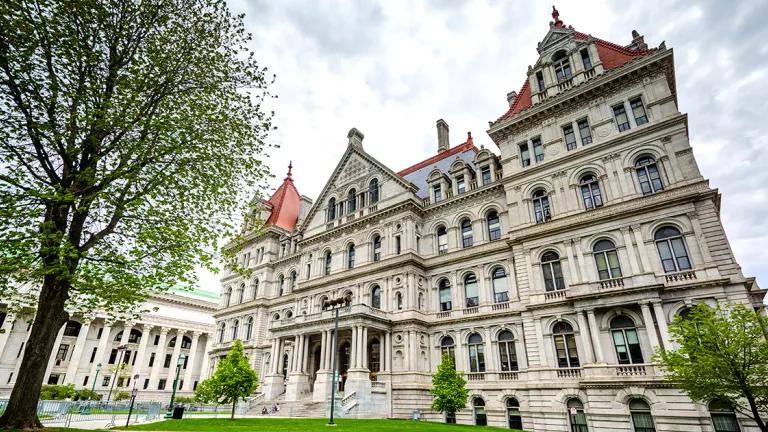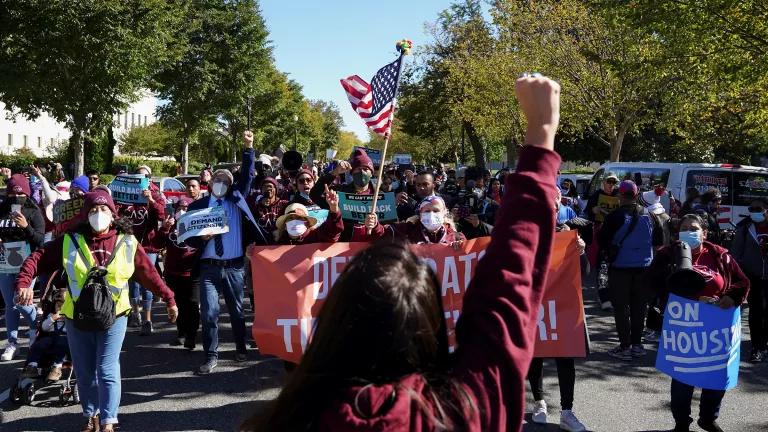Colorado Climate Action: Home Alone Edition
With the holiday season upon us and the new year just around the corner, now is the time to plan for next year’s climate action priorities. And what better plan than one inspired by the holiday classic Home Alone.

Part of NRDC's Year-End Series Reviewing 2020 Climate & Clean Energy Developments
As 2020 comes to a close, we can look back at a year filled with lots of data, analysis, and discussion courtesy of the State's Colorado Greenhouse Gas Pollution Reduction Roadmap and the Committing to Climate Action report from NRDC and partners showing how Colorado can commit to bold climate action in every sector. But what’s analysis without action? With the holiday season upon us and the new year just around the corner, now is the time to plan for next year’s climate action priorities. And what better plan than one inspired by the holiday classic Home Alone.
“This is our *home.* *We* have to defend it.”
This year, the COVID-19 pandemic, coupled with a national reckoning with police brutality and racial injustice, showed us how fragile our home and livelihoods really are. The crisis left millions, especially in communities of color and low-income communities, struggling to keep the lights on, to keep a roof over their heads, and to stay alive—difficulties made even worse in Colorado by a historic year for wildfires. Taken all together, we have seen a glimpse of what we can expect from a future where we are too slow to defend our communities against the intersecting threats of disease, racism, and climate change.
“I’m eating *fossil fuels* and watching rubbish, you better come out and stop me!”
For decades, we’ve been feeding off dirty fossil fuels like coal and gas to power our state and country. As a result, the power sector is one of the leading causes of greenhouse gas emissions and climate change. That makes deep and rapid decarbonization of our power one of the most impactful and cost-effective shifts we can make as a state in the next ten years.
Two big power sector opportunities in Colorado in the coming year will be Tri-State’s electric resource plan (out now) and Xcel’s Clean Energy plan (coming in March). These long term energy planning exercises are important because they show specific pathways for how the two largest utilities in the state will decarbonize. While both utilities have currently outlined ambitions for reaching 80 percent decarbonization by 2030, our report shows the need for upwards of 90 percent decarbonization in the same time frame. Along with our advocacy partners, we will intervene in these cases to push the utilities to rapidly and cost-effectively clean up the power sector and prepare for a just workforce and community transition.
“Buzz, your *gas guzzler.* Woof.”
Another leader in greenhouse gas emissions is the transportation sector. Cars, buses, trucks, trains, and more are beginning to surpass even the power sector in pollution. Opportunities in the new year to start curbing vehicle pollution include utility transportation electrification plans (TEPs), rulemakings, and legislation.
First, utilities can help incentivize and remove barriers for transportation electrification and electric vehicle (EV) adoption in their TEPs. They can do this by expanding EV network charging infrastructure, establishing smart rate design, and targeting rebates for income-qualified communities. Xcel’s TEP will likely be concluding in January, followed by a TEP from Black Hills.
The second bucket of transportation opportunities in the state will take place through rulemakings at the Air Quality Control Commission (AQCC). These should include geographically-based transportation district emission rules and adopting and updating vehicle emission standards to clean up cars and trucks. Clean truck rules will be particularly important as this type of pollution disproportionately harms low-income communities and communities of color.
The final opportunity is transportation funding legislation, which could come up for a vote in the upcoming legislative session. Any such legislation should be focused on shifting away from a dwindling pot of money focused on road construction and instead move toward a model for sustainable transportation funding that drives decarbonization and equity.
“I made my *emissions* disappear."
As individuals and families, we can buy more energy efficient appliances, better insulate our homes, and even transition from gas to electric appliances to help shrink our emissions. But we need support in the form of legislation, rulemakings, and city action to make it more accessible and affordable to do the right thing for the climate and our communities. Rules and legislation that make it easier to see how much energy our buildings use can help give guidance and hold accountable important decision makers and actors in the building sector. Additional policies can also help owners invest in efficiency and electrification improvements that reduce the climate impact of their buildings and improve the health and comfort for all who live and work in them.
Cities like Denver, one of twenty five cities participating in the Bloomberg Philanthropies American Cities Climate Challenge, can also take a leadership role in the new year by working on the performance of existing buildings, codes for new buildings, and benchmarking. As we pursue each of these policies, we must ensure that families of color and lower-income families can take advantage of opportunities for upgrades without increasing their housing costs. Only then can we all be on a path to make emissions from our buildings disappear.
“You're what the French call…*trés sale*”
Heavy industry, especially the oil and gas industry, will also need to make some changes beginning in the new year. The recent Colorado Oil and Gas Conservation Commission (COGCC) overhaul of the state’s regulations on energy producers was an important start. This will be followed by implementation and another rulemaking at the AQCC, with a hearing in December to consider revisions to Regulation Number 7 to establish oil and gas reduction strategies, monitoring, reductions, recordkeeping and reporting. Additionally, Suncor refinery is beginning a permitting process that can be an opportunity to not only reduce GHG and other pollution, but also address glaring environmental justice issues. Our report showed needed deep reductions in leakage rates as well as production, which hopefully these opportunities can address.
"This is it. Don't get scared now."
This really is it. The decisions we make now and over the next ten years will be the most important for reaching an equitable climate change trajectory. We can either step up to the difficult task in front of us or delay until we’re standing before a much more difficult and dangerous situation in the future. I know it can feel daunting and scary, but the best way to be less scared is to be more prepared.
Let’s start the new year off right and make some change ya filthy animals! And if over this holiday break you talk to Santa, would you please tell him that instead of presents this year I just want my family—and climate—back.




